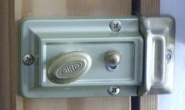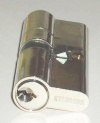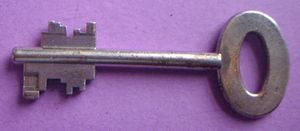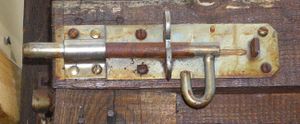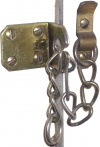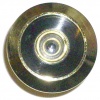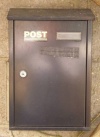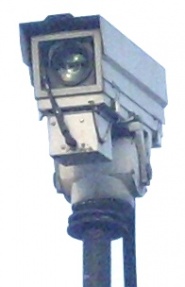Door Security
Who do you need to protect against?
When thinking of security, people may take measures designed to counteract one group of attackers only. In reality all types of crime and criminals occur, and good door security can help reduce the risk of crimes by the following:
- Casual burglars
- More determined burglars
- Vandals
- Passing angry drunkards
- Violent offenders
- Distraction burglaries
- Con artists
- Arsonists (both recreational & resentful)
- Resentful acquaintances
- Even stalkers
Information Sources
Police have crime prevention officers that can offer advice.
More precise advice is available direct from the home office online.
Neighbourhood watch schemes operate in some locations.
Government Recommendations
Most UK homes fall a fair way short of Home Ofice Recommendations on door security.
The Obvious
It shouldn't be necessary to say some things, but the reality is 30% of burglaries are committed because people didn't lock their doors or didn't close the windows. A key left under something outside is another burglar's favourite. When burglary happens in these cases there is no real likelihood of a sucessful insurance claim.
Screws
Just a handful of screws can improve the security of wooden doors. Simply replace all hinge screws and lock striker plate screws with the largest longest screws that fit. For the striker plate, drill the screwholes out 3" deep and insert wallplugs, you're now fixing to the masonry wall rather than a flimsy strip of wood.
Locks
Cylinder
The cylinder lock nightlatch, popularised by Yale, is useful to provide some security at times when people are home. However these are low security devices not recommended for securing an unattended door, so when used a more effective lock should also be fitted.
Eurolock
Eurolock cylinders can be changed easily and quickly, without any need to dismantle a lock. This is a definite advantage from a security point of view, and it keeps lock change costs right down, eliminating one reason for not changing lock barrels.
Eurolocks cover the range from weak security to fairly good.
Euros with no external security plate can be bent & broken, to gain entry.
Euros without hardened pins can be drilled.
A good euro lock has a barrel with 6 pins, hardened pins and an external security plate with no bolts accessible externally.
All cylinder locks share some vulnerability, so they're never the best possible option.
Eurolock cylinders are held in place with one bolt into the side of the cylinder. Undo this & turn the key part way, and it slides out.
Lever
2 & 3 Lever
2 and 3 lever locks are cheap & quite easy to pick. These are generally adequate for interior locks where wanted, but offer weak security on external doors.
5 Lever
5 lever deadlocks to BS3621 are the recommended lock for external doors. They give good security, provided other suitable measures are also taken, and are reasonably priced, though not cheap.
Insurers may offer a discount if your external doors are secured by these, but this comes with a gotcha. If a burglary occurs when the 5 lever lock was not locked shut, your insurance is likely to be invalid. Thus there is thus an advantage to not saying you will secure the doors with 5 lever locks.
Higher Security Types
More secure locks are also available, and are recommended for situations where a thief is likely to have specific reason to spend some time targetting your property. These include 6 lever, 7 lever, and keying patterns that are harder to defeat.
Secure the Striker Plate
A fancy lock isn't worth much if a good kick can rip it off, or rip off the striker plate. Don't secure striker plates to the frame with short screws. Drill 3" in, and use long screws with wallplugs to fix it to the masonry. Choose the fattest and thus strongest steel screws that will fit.
Lock Positions
A single central lock is not recommended, as it allows a door to bend, immediately demonstrating poor security, and permitting use of a jemmy. 2 locks at different heights are recommended. As well as preventing jemmying, 2 locks also have the advantage of being significantly tougher to defeat than a single lock.
Bolts
Additional bolts are recommended to minimise risk of forcing a door, and to prevent door bending, which enables jemmy attack.
1 bolt at each of top & bottom achieves this. These bolts are only fitted to one door, not both, as you can only put one set on before going out. Thus they are fitted to whichever door you don't use as the main exit & entrance route.
Tower bolts are a low cost option, but suffer from a defect when installed in the traditional way: any change in door alignment prevents them engaging home.
- One way to avoid this problem that can be used on a few doors is to attach the bolt to the wall or frame, so that the bolt overlaps the door. Instead of fitting the bottom bit of the bolt, a small flat metal plate is fitted to the door.
- Another way to reduce the problem is to fit the bottom-end-bit from a larger size of tower bolt, thus permitting some sideways movement.
Other designs of bolt exist that avoid this defect, but the price is much higher.
Door Chain & Bar
The door chain & door bar are the only devices that provide some degree of security when the door is open. These are particularly useful against wandering chancers, assault, and to a limited extent distraction burglaries. It also lets people know upfront that you're not a good crime target.
The strength of security provided by a chain isn't great, but its much better than nothing when the door is open.
Door bars are an alternative to chains. These are stronger, but tend to permit less opening.
Viewer
Seeing who is out there first can prevent a percentage of assaults & burglaries. A quick peek lets you know which you want to do:
- open it fully
- put the chain on
- not answer the door
- make sure you look perfect first
- hide the bodies quick
Letterbox cage
- Prevents reaching in to operate locks or reach nearby keys
- Makes reaching in with wire more difficult
- Prevents fishing out of letters for ID fraud from under the door
- Check the cage shape prevents hand entry retrieving letters in the cage.
- check the cage won't cause a problem with the door opening properly
Restricting how far the letter flap opens is a free alternative to a cage when budget is short. With wooden doors this is done using 2 round headed wood screws, one into the wood at each end of the flap. It prevents hands reaching in, but nothing else.
Glass
Plain
Plain glass in the door is vulnerable, especially when whole panels are glazed. Replacement with a security type of glass is best where the glass is without character. If not replaced, it can be reinforced with iron bars, not prison cell sized bars, but small discreet bars as used in leaded glazing.
Toughened, Laminated & Wired
Toughened & laminated glass both have extra resistance to attack, and do not normally need further protection.
Laminated glass is particularly good against forced entry because it requires repeated glass smashing attacks to get through it, and every hit makes the dreaded glass breaking noise.
Toughened glass is much stronger than plain & laminated glasses, but shatters completely in one go, so is less secure than laminated. Glazing suppliers need time to get toughened glass hardened after it has been cut.
Wired glass holds together once broken, but with little strength, and is not effective security glazing.
Leaded
Leaded lights are weak, and must be reinforced by regular iron bars. A lot of leaded windows have these bars built in, but some don't. Without them, entry is easy.
Fully glazed doors
Exterior doors that consist only of an outer frame with a single full size glass sheet are not recommended. These are inherently insecure and are better replaced. If its desired to keep the door, fitting laminated glass is the most secure option. However BR now requires toughened glass be fitted to such doors.
Post Box
Securing the letterbox permanently closed and fitting a post box is more secure than a letterbox cage.
- Prevents wire access to locks thru the letterbox
- Prevents arson
- Prevents viewing of house contents
- Is an upfront statement of security
- Box must be locking
- For shared postboxes, by law all receipients must have a key to the box
Warning Signs
Some signs may give a quick indication that the householder is not careless about security, encouraging wandering thieves to look elsewhere.
Useful signs include:
- Neighbourhood watch
- Property security marked
- Burglar alarm signs
Signs should be placed within view of anyone standing at the front door.
None of these signs prevent entry, and burglar alarm signs are not always effective deterrents, but signs do put some people off.
Giveaway signs
Some indicators correlate well with easy entry, and burglars often use these to decide how easy burglary is likely to be:
- House not kept clean
- House not kept tidy
- Untidy or overgrown garden
- Any other visible unsolved issues that a householder would normally consider a much higher priority than decent security
Hinge Bolts
Low on the external door security list is hinge bolts. These are concealed bolts on the hinge side that engage when the door is closed, thus reducing the chance of removing the door from the frame.
This is not one of the most popular methods of attack, but hinge bolts are very cheap and can stop the small number of more violent door attacks.
It may seem odd to secure a door against violent attack when a glass window is nearby, but attackers come in all types. Some don't want to climb in through a window, and some are just in no state to think straight.
Key Loss
Never have anything that can identify you or your house on your keyring.
If you lose a key, replacing the lock or cylinder is a good idea.
Some insurance companies operate key return schemes. You put their tag on your key with a code, and if its handed in to them they pay the finder a small amount and return the keys to you.
A no cost option is to swap keyring tags with someone you trust, so your keys are marked please return to their address, and theirs are marked please return to yours. Offer of a small reward improves chances of return. This is not as secure as company operated key return schemes.
Rekeying
Cylinder
Cylinder locks are normally rekeyed by fitting a new lock cylinder. Rekeying by swapping pins is possible, but usually not worthwhile. Replacing a lock cylinder is quite a simple job, and replacements are cheap.
For exterior locks, the cylinders should have hardened pins. Cheapie brands tend to lack this feature, and are easily drilled. These lower security ones are better for interior use, as they're much easier to drill & replace if keys are lost.
Lever
5 Lever locks can be rekeyed once by swapping lever positions and purchasing new keys to fit from a key cutter. The lever pattern must always be symmetrical, so one swaps lever 1 with 2 and 4 with 5. This rekeying method is useful for higher priced locks, where it avoids:
- the cost of a new lock
- the cost of fitting the new lock
Cutting keys with no master key takes longer, so visiting the key cutter during a quiet time is a good plan, otherwise your request may be refused.
2,3 and 5 lever locks can be also rekeyed by grinding a pair of levers after taking them out of the lock. The pair are clamped together in a vice or mole grips and filed or ground.
Indenting
Indenting is a basic method of rekeying lever locks that costs nothing, but invalidates any BS type approval. Its useful for low budget situations where its desired to retain an existing high security lock.
The lock is removed from the door, and a masonry nail is hammered into the side of the lock casing on each side to indent the outer casing. The purpose is to prevent any existing keys from being able to rotate in the lock far enough to open it. The sides of the keys are then filed so they operate again.
Naturally this method fails if the dents are in the wrong place, or the metal is dished to such an extent as to prevent the proper operation of the lock. Its only necessary to dish it enough to stop an unmodified key turning.
New House
Always replace or rekey all external locks when you buy a house. You have no idea who has keys to those doors.
Used Locks & Barrels
Used locks & cylinders are ok if the seller has no way to know where you live. But if you let them have your address (eg by paying by credit card) you've effectively given them the key to your door. Some old locks aren't approved to the relevant BS or EN sometimes required by house insurers. Standard lock cylinders aren't usually worth buying used, as copying just one key costs more than a new cylinder with 3 keys.
Heavy Duty Security
Where repeat attacks have occured, or heavy physical attack is expected, there are further measures that can improve security.
Steel Plate
Steel doors are justified where heavy physical attack is expected, or where burglars may work on a door undisturbed.
Steel doors and frames are available, but not cheap. A lower cost DIY option is to face plywood with a sheet of 1.6mm mild steel.
Further attack resistance is gained if the steel is folded at 90 degrees over the wood around the 4 edges. If only one edge is folded, it should be the bottom edge, which is otherwise the weakest point.
Folded steel doors can't be trimmed, they need to be correct first time, and any adjustment made on the frame.
Wooden door frames are not known for strength. An exterior frame of 3 or 4 pieces of square section steel tube can improve security considerably. Welding them increases strength a good deal further, and makes the assembly look much stronger.
CCTV
Monitored
For locations where crime is expected, monitored CCTV is an effective option.
Unmonitored
Unmonitored CCTV is sometimes effective, but it should be a system with sufficient video quality and suitable recording format for evidence, and the recording equipment needs to remain undetected by the intruder, or they will simply take the tape.
Basic
Basic low cost systems may put off some, but will not stop someone that knows what they're doing and comes back prepared. Generally they aren't much use as evidence.
Patrols
Patrols make a real difference to business premises security. The same principle can be applied to homes by letting someone trustworthy stay in your house when you go away, eg on holiday.
Insurance companies need to be notified if the house will be unoccupied for 30 days or more, as the risk increases significantly. Failing to notify can invalidate the insurance.

